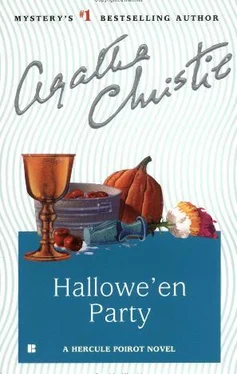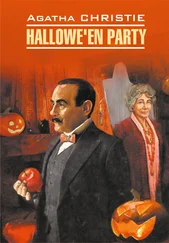Agatha Christie - Hallowe'en Party
Здесь есть возможность читать онлайн «Agatha Christie - Hallowe'en Party» весь текст электронной книги совершенно бесплатно (целиком полную версию без сокращений). В некоторых случаях можно слушать аудио, скачать через торрент в формате fb2 и присутствует краткое содержание. Год выпуска: 2004, ISBN: 2004, Издательство: Berkley, Жанр: Классический детектив, на английском языке. Описание произведения, (предисловие) а так же отзывы посетителей доступны на портале библиотеки ЛибКат.
- Название:Hallowe'en Party
- Автор:
- Издательство:Berkley
- Жанр:
- Год:2004
- ISBN:ISBN-13: 978-0425129630
- Рейтинг книги:3 / 5. Голосов: 1
-
Избранное:Добавить в избранное
- Отзывы:
-
Ваша оценка:
- 60
- 1
- 2
- 3
- 4
- 5
Hallowe'en Party: краткое содержание, описание и аннотация
Предлагаем к чтению аннотацию, описание, краткое содержание или предисловие (зависит от того, что написал сам автор книги «Hallowe'en Party»). Если вы не нашли необходимую информацию о книге — напишите в комментариях, мы постараемся отыскать её.
Hallowe'en Party — читать онлайн бесплатно полную книгу (весь текст) целиком
Ниже представлен текст книги, разбитый по страницам. Система сохранения места последней прочитанной страницы, позволяет с удобством читать онлайн бесплатно книгу «Hallowe'en Party», без необходимости каждый раз заново искать на чём Вы остановились. Поставьте закладку, и сможете в любой момент перейти на страницу, на которой закончили чтение.
Интервал:
Закладка:
And so he wanted to come out of the room without anyone seeing him and I suppose he looked up and saw me and he got back into the room and shut the door and waited until the hall was empty before coming out.
But not because he'd killed her. No. Just the shock of finding her dead."
"And yet you said nothing? You didn't mention who it was you'd seen, even after the death was discovered?"
"No. I oh, I couldn't. He's you see, he's so young was so young, I suppose I ought to say now. Ten. Ten eleven at most and I mean I felt he couldn't have known what he was doing, it couldn't have been his fault exactly. He must have been morally not responsible. He's always been rather queer, and I thought one could get treatment for him. Not leave it all to the police. Not send him to approved places. I thought one could get special psychological treatment for him, if necessary. I-I meant well. You must believe that, I meant well."
Such sad words, Poirot thought, some of the saddest words in the world.
Mrs. Drake seemed to know what he was thinking.
"Yes," she said, "'I did it for the best. I meant well.' One always thinks one knows what is best to do for other people, but one doesn't. Because, you see, the reason he looked so taken aback must have been that he either saw who the murderer was, or saw something that would give a clue to who the murderer might be. Something that made the murderer feel that he himself wasn't safe. And so-and so he's waited until he got the boy alone and then drowned him in the brook so that he shouldn't speak, so that he shouldn't tell.
If I'd only spoken out, if I'd told you, or told the police, or told someone, but I thought I knew best."
"Only to-day," said Poirot, after he had sat silent for a moment or two, watching Mrs. Drake where she sat controlling her sobs, "I was told that Leopold had been very flush of money lately. Somebody must have been paying him to keep silent."
"But who, who?"
"We shall find out," said Poirot. "It will not be long now."
IT was not very characteristic of Hercule Poirot to ask the opinions of others. He was usually quite satisfied with his own opinions.
Nevertheless, there were times when he made exceptions. This was one of them. He and Spence had had a brief conversation together and then Poirot had got in touch with a car hire service, and after another short conversation with his friend and with Inspector Raglan, he drove off. He had arranged with the car to drive him back to London but he had made one halt on the way there. He drove to The Elms. He told the driver of the car that he would not be long-a quarter of an hour at most-and then he sought audience with Miss Emiyn.
"I am sorry to disturb you at this hour.
It is no doubt the hour of your supper or dinner."
"Well, I do you at least the compliment, Monsieur Poirot, to think you would not disturb me at either supper or dinner unless you have a valid reason for so doing."
"You are very kind. To be frank, I want your advice."
"Indeed?"
Miss Ernlyn looked slightly surprised.
She looked more than surprised, she looked sceptical.
"That does not seem very characteristic of you, Monsieur Poirot. Are you not usually satisfied with your own opinions?"
"Yes, I am satisfied with my own opinions, but it would give me solace and support if someone whose opinion I respected agreed with them."
She did not speak, merely looked at him inquiringly.
"I know the killer of Joyce Reynolds," he said.
"It is my belief that you know it also."
"I have not said so," said Miss Emiyn."
"No. You have not said so. And that might lead me to believe that it is on your part an opinion only."
"A hunch?" inquired Miss Emiyn, and her tone was colder than ever.
"I would prefer not to use that word. I would prefer to say that you had a definite opinion."
"Very well then. I will admit that I have a definite opinion. That does not mean that I shall repeat to you what my opinion is."
"What I should like to do. Mademoiselle, is to write down four words on a piece of paper. I will ask you if you agree with the four words I have written."
Miss Ernlyn rose. She crossed the room to her desk, took a piece of writing paper and came across to Poirot with it.
"You interest me," she said. "Four words."
Poirot had taken a pen from his pocket.
He wrote on the paper, folded it and handed it to her. She took it, straightened out the paper and held it in her hand, looking at it.
"Well?" said Poirot.
"As to two of the words on that paper, I agree, yes. The other two, that is more difficult. I have no evidence and, indeed, the idea had not entered my head."
"But in the case of the first two words, you have definite evidence?"
"I consider so, yes."
"Water," said Poirot, thoughtfully.
"As soon as you heard that, you knew. As soon as I heard that I knew. You are sure, and I am sure. And now," said Poirot, "a boy has been drowned in a brook. You have heard that?"
"Yes. Someone rang me up on the telephone and told me. Joyce's brother. How was he concerned?"
"He wanted money," said Poirot. "He got it. And so, at a suitable opportunity, he was drowned in a brook."
His voice did not change. It had, if anything, not a softened, but a harsher note.
"The person who told me," he said, "was riddled with compassion. Upset emotionally. But I am not like that. He was young, this second child who died, but his death was not an accident. It was, as so many things are in life, a result of his actions. He wanted money and he took a risk. He was clever enough, astute enough to know he was taking a risk, but he wanted the money. He was ten years old but cause and effect is much the same at that age as it would be at thirty or fifty or ninety. Do you know what I think of first in such a case?"
"I should say," said Miss Ernlyn, "that you are more concerned with justice than with compassion."
"Compassion," said Poirot, "on my part would do nothing to help Leopold. He is beyond help. Justice, if we obtain justice, you and I, for I think you are of my way of thinking over this justice, one could say, will also not help Leopold. But it might help some other Leopold, it might help to keep some other child alive, if we can reach justice soon enough. It is not a safe thing, a killer who has killed more than once, to whom killing has appealed as a way of security. I am now on my way to London where I am meeting with certain people to discuss a way of approach. To convert them, perhaps, to my own certainty in this case."
"You may find that difficult," said Miss Ernlyn.
"No, I do not think so. The ways and means to it may be difficult but I think I can convert them to my knowledge of what has happened.
Because they have minds that understand the criminal mind. There is one thing more I would ask you. I want your opinion. Your opinion only this time, not evidence. Your opinion of the character of Nicholas Ransom and Desmond Holland. Would you advise me to trust them?"
"I should say that both of them were thoroughly trustworthy. That is my opinion. They are in many ways extremely foolish, but that is only in the ephemeral things of life. Fundamentally, they are sound. Sound as an apple without maggots in it."
"One always comes back to apples," said Hercule Poirot sadly. "I must go now. My car is waiting. I have one more call still to pay."
"HAVE you heard what's on at Quarry Wood?" said Mrs. Cartwright, putting a packet of Fluffy Flakelets and Wonder White into her shopping bag.
"Quarry Wood?" said Elspeth McKay, to whom she was talking.
"No, I haven't heard anything particular." She selected a packet of cereal. The two women were in the recently opened supermarket making their morning purchases.
"They're saying the trees are dangerous there. Couple of forestry men arrived this morning. It's there on the side of the hill where there's a steep slope and a tree leaning sideways. Could be, I suppose, that a tree could come down there. One of them was struck by lightning last winter but that was farther over, I think. Anyway, they're digging round the roots of the trees a bit, and a bit farther down too. Pity.
Читать дальшеИнтервал:
Закладка:
Похожие книги на «Hallowe'en Party»
Представляем Вашему вниманию похожие книги на «Hallowe'en Party» списком для выбора. Мы отобрали схожую по названию и смыслу литературу в надежде предоставить читателям больше вариантов отыскать новые, интересные, ещё непрочитанные произведения.
Обсуждение, отзывы о книге «Hallowe'en Party» и просто собственные мнения читателей. Оставьте ваши комментарии, напишите, что Вы думаете о произведении, его смысле или главных героях. Укажите что конкретно понравилось, а что нет, и почему Вы так считаете.












